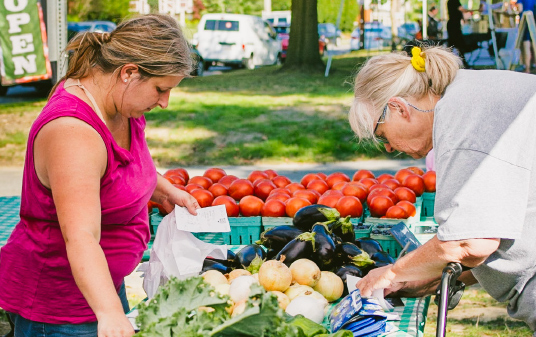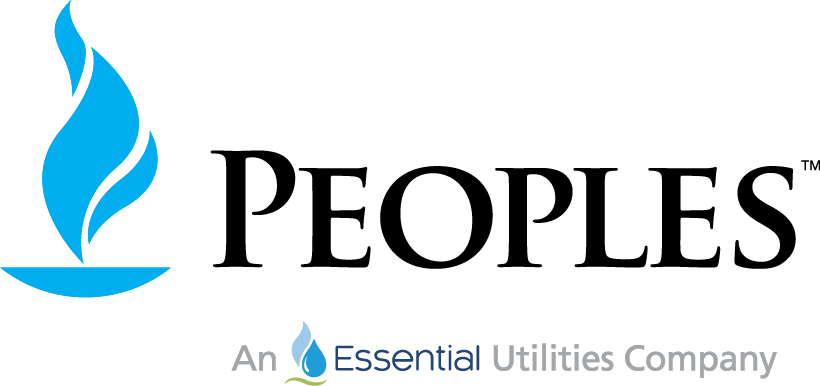At Food Assistance Match, we believe in the power of community to make a meaningful impact on hunger relief.
Whether you’re looking to make a financial donation, offer your time, or provide resources, your support is crucial in helping us connect food assistance with those who need it most. Here, you’ll find all the ways you can get involved and make a difference. Together, we can fight hunger and bring hope to families across our community.
Our Mission
Food Assistance Match, Inc. (FAM) is a 501(c)3 nonprofit organization dedicated to increasing access to fresh, nutritious food from local farmers and small businesses for individuals and families who are most in need. Through our novel, dignity-first approach, FAM addresses food insecurity challenges while supporting the enterprises and communities that are the fabric of southwestern Pennsylvania at select farmers’ markets in the region.
2024 Impact Report: Your Community in Action
Through the power of community support, we helped provide over $119,000 in fresh, local food to neighbors in need in 2024. Our annual impact report showcases how farmers markets, local growers, and generous supporters like you are creating a more resilient food system in southwestern Pennsylvania. Every matched dollar strengthens families, supports local agriculture, and builds lasting community connections. Thank You to all of FAM-ily Members!
Ways to Support FAM
Corporate Sponsorships
Monthly FAM-ily Donor
Thank You To Our 2025 Supporters!

Thank You to our FAM-ily members!
Stay Up to Date with the FAM-ily
Enter your email below to receive our monthly newsletter.
Impact Stories
FAQ's about FAM and Food Insecurity
How can I support FAM?
You can support FAM by donating directly through our website, organizing a fundraising event, spreading the word about our mission, and volunteering for FAM at one of our participating Farmers Markets. Every contribution helps us provide critical food assistance to those in need.
Is my donation tax-deductible?
Yes, donations to FAM are tax-deductible to the extent allowed by law. You’ll receive a receipt for your donation, which you can use for tax purposes.
Can I set up recurring donations?
Absolutely! Recurring donations are a great way to provide consistent support. You can set them up on our donation page.
Are there other ways to give besides monetary donations?
Yes! We also accept corporate sponsorships, partnerships and volunteers! Please contact us to discuss these opportunities.
Why is food assistance important in Pennsylvania?
Food assistance is crucial in Pennsylvania due to a range of economic and social factors that affect access to nutritious food for many residents. Here are a few reasons why food assistance is particularly important:
- High Rates of Food Insecurity: Pennsylvania has a significant number of households facing food insecurity, meaning they lack consistent access to enough food for an active, healthy life. Economic downturns, the COVID-19 pandemic, and rising inflation have made it difficult for many families to afford basic groceries, forcing them to rely on food assistance.
- Vulnerable Populations: Several vulnerable groups, including children, seniors, and people with disabilities, are disproportionately affected by food insecurity. School meal programs, senior meal delivery services, and food banks are essential to providing these populations with the nutrition they need.
- Rural and Urban Challenges: Pennsylvania has both urban and rural areas where food deserts, or areas with limited access to affordable and nutritious food, exist. In urban centers, many people live in neighborhoods without nearby grocery stores. In rural areas, long distances to stores and higher food prices make it challenging for residents to find healthy options.
- Economic Inequality: The state’s growing economic inequality means that while some households are financially secure, others struggle to make ends meet. This disparity increases the importance of food assistance programs to bridge the gap and provide support for families facing financial hardships.
- Unemployment and Underemployment: Pennsylvania’s job market, particularly after the pandemic, has seen periods of high unemployment and underemployment, affecting families’ ability to afford basic necessities like food. Food assistance programs provide a critical safety net for individuals and families struggling to find or maintain stable employment.
- Health Outcomes: Access to nutritious food is directly linked to better health outcomes. Without proper nutrition, individuals face a higher risk of developing chronic health conditions, which can lead to higher healthcare costs. Food assistance programs help ensure that those in need can access the nutritious food they require for good health.
These challenges make food assistance a critical service in Pennsylvania, helping to ensure that no family has to choose between paying for food and other essential needs like housing, healthcare, or education.
How widespread is food insecurity in Pennsylvania?
Food insecurity remains a significant issue across Pennsylvania, affecting a diverse range of communities. According to recent statistics, approximately 10% of Pennsylvania households are food insecure. This means that around 1 in 10 families struggle to afford enough food, leading to difficult choices between paying for groceries and other essentials like housing, healthcare, or utilities.
In the western part of the state, particularly in the Greater Pittsburgh area, food insecurity rates are similar to the state average, but some neighborhoods experience much higher levels. For instance, in Allegheny County, it’s estimated that around 12% of residents face food insecurity, with some areas seeing even higher rates due to economic disparities, unemployment, and the lingering effects of the COVID-19 pandemic.
The issue is particularly pronounced among certain groups, including children and seniors. About 1 in 7 children in Pennsylvania lives in a food-insecure household, while seniors face food insecurity at a rate of nearly 10%. In the Pittsburgh area, local food banks and assistance programs play a crucial role in supporting these vulnerable populations, especially in neighborhoods where access to affordable, nutritious food is limited.
This widespread issue highlights the critical need for food assistance programs to support those struggling to make ends meet. Organizations like Food Assistance Match help ensure that individuals and families in western Pennsylvania and beyond have access to the food they need to lead healthy, productive lives.
Who benefits from food assistance programs like FAM's?
Food assistance programs like FAM’s benefit a wide range of individuals and families who struggle with food insecurity. This includes low-income households facing financial hardships, where food assistance provides essential support to ensure families can put nutritious meals on the table. Children benefit significantly, as consistent access to healthy food contributes to better educational outcomes and overall well-being. Seniors and people with disabilities also rely on these programs to help maintain their health and independence. In communities where food deserts limit access to fresh, affordable produce, FAM’s assistance ensures that those most vulnerable have the nourishment they need to lead healthy lives.
Additionally, FAM positively impacts local economies by supporting vendors at farmers markets. By enhancing the buying power of low-income patrons, FAM increases sales for local farmers and producers, fostering a thriving market community. This program not only helps maintain the viability of local agriculture but also encourages sustainable farming practices by connecting producers directly with a broader customer base. This symbiotic relationship enhances the economic stability of local vendors and ensures a steady supply of fresh, locally-sourced produce for the community.
What does FAM do?
FAM helps to make fresh, locally grown food accessible to lower-income individuals and families who may otherwise find it inaccessible at farmers markets. By multiplying the buying power of food assistance programs like SNAP, the Farmers Market Nutrition Program, and WIC, FAM enables patrons to take home up to three times more locally-sourced food and goods. This not only improves overall health outcomes but also strengthens the regional economy and fosters a more resilient local food ecosystem.
Currently active in three farmers markets in the Pittsburgh region—Bellevue Farmers Market, Bethel Park Farmers Market, and Cranberry Farmers Market—FAM operates through a simple process. FAM patrons select their items from eligible vendors, receive a receipt, process transactions at a central location where the match is applied, and volunteers retrieve purchased goods from vendors for the patrons, who are then reimbursed for their total purchases.
How does FAM help people in need?
Food Assistance Match (FAM) significantly enhances the accessibility of fresh, locally sourced food for low-income individuals and families. Many of them struggle to afford healthy produce at farmers markets, but FAM changes that by extending the purchasing power of programs like SNAP, the Farmers Market Nutrition Program, and WIC. By supplementing these benefits, FAM enables participants to acquire more locally grown goods. This approach not only bolsters the health and nutrition of families but also stimulates the regional economy by supporting local farmers and food producers.
Through its presence at lcoal farmers markets, FAM follows a well-organized system that simplifies the process for patrons. They select items from eligible vendors, get a receipt, and complete transactions at a central hub where the matched benefits are applied. Volunteers then gather the purchased items for the patrons, ensuring a seamless experience.
Beyond direct food assistance, FAM’s advocacy efforts focus on raising awareness about food insecurity in Pennsylvania and the importance of local food systems. By engaging with the community and other partners, FAM fosters a network that enhances the impact of food assistance programs and addresses hunger at its roots.
Moreover, FAM’s focus on the Greater Pittsburgh area allows it to understand and respond to the unique needs of western Pennsylvania. Its localized approach ensures that support is directed where it is most needed, strengthening the food assistance infrastructure and ultimately helping thousands of individuals and families lead healthier, more secure lives.
Why does FAM focus on fundraising and awareness?
Food Assistance Match (FAM) focuses on fundraising and awareness because these activities are crucial to sustaining and expanding the program’s impact. Fundraising enables FAM to generate the financial resources necessary to offer matching funds that amplify the purchasing power of food assistance programs. Without these funds, the program could not provide the vital support needed to help low-income individuals and families access fresh, locally grown food.
Raising awareness is equally important, as it educates the public about the prevalence of food insecurity in Pennsylvania and the positive role that local food assistance programs can play. This increased visibility not only drives donations but also fosters a community of supporters, advocates, and partners who can further amplify FAM’s mission. Together, fundraising and awareness ensure that FAM can effectively provide critical food assistance to those in need.
How can I stay updated on FAM's work?
You can stay updated by subscribing to our newsletter, following us on social media, regularly visiting our website and visiting one of our participating Farmer’s Markets!















